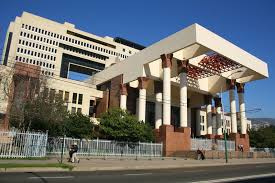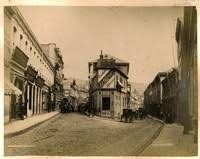What is the role of Valparaíso in Chilean politics?

What is the role of Valparaíso in Chilean politics?
What is the role of Valparaíso in Chilean politics? The Role of Valparaíso in Chilean Politics: A Historical and Contemporary Perspective.
Valparaíso, a city nestled along the Chilean coast, is not only known for its vibrant culture and stunning vistas but also plays a significant role in the political landscape of Chile.
Historically, it has served as a political hub and a center for social movements. Its strategic location as a major port city has contributed to its influence on both national and regional politics.
This exploration delves into the historical and contemporary political significance of Valparaíso, examining its evolution as a political center, its role in social movements, and its impact on national governance.

Historical Significance as a Political Hub
Valparaíso’s political significance can be traced back to the 19th century when it emerged as one of Chile’s most important cities.
The establishment of the port facilitated trade and commerce, positioning Valparaíso as a key economic and political center.
During this period, the city attracted various political figures, intellectuals, and social activists who contributed to the development of Chilean politics.
Valparaíso served as a melting pot of ideas, where revolutionary thoughts and movements often took root.
The city became a battleground for political ideologies, especially during the tumultuous years of the Chilean Civil War and the subsequent establishment of a republican government.
The political discourse that emerged during this time has shaped the city’s identity as a site of political engagement.
Valparaíso as a Symbol of Social Movements
Valparaíso has a rich tradition of social activism, often serving as a backdrop for protests and movements advocating for social justice and political reform.
The city has been a focal point for various social movements, including labor rights, environmental activism, and educational reforms.
The 1960s and 1970s saw a surge of political mobilization in Valparaíso, as the working class organized to demand better labor conditions and social equity.
This activism laid the groundwork for broader national movements that ultimately influenced the direction of Chilean politics.
Even today, Valparaíso continues to be a platform for social movements, with residents actively participating in protests against inequality, environmental degradation, and other pressing issues.
The city’s rich history of activism contributes to its ongoing relevance in the political landscape of Chile.
The Chilean Congress and Valparaíso
Valparaíso holds a prominent place in Chilean politics as the location of the National Congress. The building, a historic architectural gem, houses both the Chamber of Deputies and the Senate.
The presence of the National Congress in Valparaíso underscores the city’s political significance and serves as a symbol of democratic governance in Chile.
This location facilitates political discourse, legislative processes, and public engagement in the political sphere.
The city’s role as the home of the National Congress also fosters a sense of political awareness among its residents. Citizens often engage with lawmakers, participate in public discussions, and advocate for issues that matter to their communities.
Economic Influence on Political Decision-Making
The economic landscape of Valparaíso has a direct impact on its political dynamics. As a major port city, the economy heavily relies on trade, shipping, and maritime activities, influencing local and national policies.
The economic interests of the port often intersect with political decision-making, particularly regarding labor laws, environmental regulations, and infrastructure development.
This relationship can lead to tensions between various stakeholders, including labor unions, business owners, and government officials.
Moreover, the economic disparities within the city can shape political agendas, with local leaders often advocating for policies that address social and economic inequality.
Valparaíso’s economic challenges, including unemployment and poverty, remain critical issues that local politicians must address.
Valparaíso’s Role in Regional Politics
Valparaíso is not only significant on a national level but also plays a vital role in regional politics. As the capital of the Valparaíso Region, the city influences the political dynamics of surrounding areas.
Local government structures often reflect broader trends in Chilean politics, with regional leaders advocating for policies that address specific challenges faced by their constituents.
Valparaíso serves as a hub for regional discussions, shaping political agendas that impact the entire region.
The city’s strategic location also positions it as a key player in trade and commerce within the region, further solidifying its political importance.
Regional cooperation on issues such as transportation, environmental protection, and economic development is often centered around Valparaíso.
Educational Institutions and Political Awareness
Valparaíso is home to several universities and educational institutions that contribute to political awareness and activism among the youth.
These institutions often serve as breeding grounds for political discourse and social movements.
Students and faculty members actively engage in discussions about social issues, political ideologies, and governance.
Many universities in Valparaíso emphasize civic engagement, encouraging students to participate in community initiatives and political activism.
This educational focus fosters a generation of politically aware citizens who are more likely to engage in the democratic process, advocate for social change, and contribute to the political landscape of Chile.
Contemporary Political Challenges
In recent years, Valparaíso has faced several political challenges that reflect broader issues within Chile. The protests that erupted in 2019 over social inequality and political corruption saw significant participation from Valparaíso residents.
These protests highlighted the frustrations of the population regarding issues such as education, healthcare, and economic disparities.
Valparaíso became a focal point for the broader national movement, emphasizing the city’s ongoing relevance in shaping political discourse.
Local politicians have since had to navigate these challenges, responding to the demands of their constituents while addressing systemic issues within the political framework.
The city’s history of activism continues to inform contemporary political engagement and dialogue.
The Future of Political Engagement in Valparaíso
As Valparaíso moves forward, its role in Chilean politics is likely to evolve. The city’s historical significance, coupled with its vibrant civic engagement, positions it as a key player in shaping the future of governance in Chile.
Increased political awareness among the youth, driven by educational institutions and social movements, suggests a continued focus on activism and reform.
Valparaíso’s residents are poised to remain engaged in political discussions, advocating for change and holding elected officials accountable.
Moreover, the ongoing dialogue surrounding social justice, environmental sustainability, and economic equity will likely influence local political agendas, ensuring that Valparaíso remains a dynamic center of political engagement in the years to come.
Valparaíso’s role in Chilean politics is multifaceted
Valparaíso’s role in Chilean politics is multifaceted, encompassing its historical significance as a political hub, its ongoing legacy of social movements, and its status as the location of the National Congress.
The city’s economic dynamics, regional influence, and educational institutions contribute to its political landscape, fostering a culture of activism and civic engagement.
As Valparaíso navigates contemporary challenges and opportunities, its residents are likely to continue shaping the future of Chilean politics.
Valparaíso’s vibrant history and its commitment to social justice ensure that it remains an essential player in the ongoing discourse about governance, representation, and community engagement in Chile.





Leave a Reply